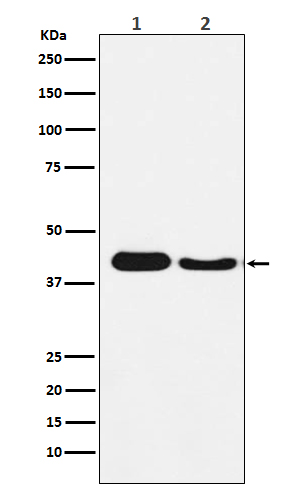Atg4A Antibody
Rabbit mAb
- SPECIFICATION
- CITATIONS
- PROTOCOLS
- BACKGROUND

Application
| WB, IHC, IP |
|---|---|
| Primary Accession | Q8WYN0 |
| Reactivity | Rat |
| Clonality | Monoclonal |
| Other Names | Apg4a; ATG4A; Atg4al; AUT like 2 cysteine endopeptidase; Autl2; Autophagin 2; Autophagin-2; Autophagy related 4A cysteine peptidase; |
| Isotype | Rabbit IgG |
| Host | Rabbit |
| Calculated MW | 45378 Da |
| Dilution | WB 1:500~1:2000 IHC 1:50~1:200 IP 1:50 |
|---|---|
| Purification | Affinity-chromatography |
| Immunogen | A synthesized peptide derived from human Atg4A |
| Description | The cysteine protease Atg4 is pivotal to autophagosome membrane generation and regulation. Atg4 primes the Atg8 homologue for lipidation by cleaving its carboxy terminus and exposing its glycine residue for E1-like enzyme Atg7. The Atg8 homologue is transferred to the E2-like enzyme Atg3 before forming the Atg8-PE conjugate. During later stages of autophagy, Atg4 can reverse this lipidation event by cleaving PE, thereby recycling the Atg8 homologue. |
| Storage Condition and Buffer | Rabbit IgG in phosphate buffered saline , pH 7.4, 150mM NaCl, 0.02% sodium azide and 50% glycerol. Store at +4°C short term. Store at -20°C long term. Avoid freeze / thaw cycle. |
| Name | ATG4A {ECO:0000303|Ref.20, ECO:0000312|HGNC:HGNC:16489} |
|---|---|
| Function | Cysteine protease that plays a key role in autophagy by mediating both proteolytic activation and delipidation of ATG8 family proteins (PubMed:12473658, PubMed:15169837, PubMed:17347651, PubMed:21177865, PubMed:21245471, PubMed:22302004, PubMed:32732290). The protease activity is required for proteolytic activation of ATG8 family proteins: cleaves the C-terminal amino acid of ATG8 proteins to reveal a C-terminal glycine (PubMed:12473658, PubMed:15169837, PubMed:17347651, PubMed:21177865, PubMed:21245471, PubMed:22302004). Exposure of the glycine at the C-terminus is essential for ATG8 proteins conjugation to phosphatidylethanolamine (PE) and insertion to membranes, which is necessary for autophagy (PubMed:12473658, PubMed:15169837, PubMed:17347651, PubMed:21177865, PubMed:21245471, PubMed:22302004). Preferred substrate is GABARAPL2 followed by MAP1LC3A and GABARAP (PubMed:12473658, PubMed:15169837, PubMed:17347651, PubMed:21177865, PubMed:21245471, PubMed:22302004). Protease activity is also required to counteract formation of high-molecular weight conjugates of ATG8 proteins (ATG8ylation): acts as a deubiquitinating- like enzyme that removes ATG8 conjugated to other proteins, such as ATG3 (PubMed:31315929, PubMed:33773106). In addition to the protease activity, also mediates delipidation of ATG8 family proteins (PubMed:29458288, PubMed:33909989). Catalyzes delipidation of PE- conjugated forms of ATG8 proteins during macroautophagy (PubMed:29458288, PubMed:33909989). Compared to ATG4B, the major protein for proteolytic activation of ATG8 proteins, shows weaker ability to cleave the C-terminal amino acid of ATG8 proteins, while it displays stronger delipidation activity (PubMed:29458288). Involved in phagophore growth during mitophagy independently of its protease activity and of ATG8 proteins: acts by regulating ATG9A trafficking to mitochondria and promoting phagophore-endoplasmic reticulum contacts during the lipid transfer phase of mitophagy (PubMed:33773106). |
| Cellular Location | Cytoplasm {ECO:0000250|UniProtKB:Q8BGE6}. |

Thousands of laboratories across the world have published research that depended on the performance of antibodies from Abcepta to advance their research. Check out links to articles that cite our products in major peer-reviewed journals, organized by research category.
info@abcepta.com, and receive a free "I Love Antibodies" mug.
Provided below are standard protocols that you may find useful for product applications.
If you have used an Abcepta product and would like to share how it has performed, please click on the "Submit Review" button and provide the requested information. Our staff will examine and post your review and contact you if needed.
If you have any additional inquiries please email technical services at tech@abcepta.com.













 Foundational characteristics of cancer include proliferation, angiogenesis, migration, evasion of apoptosis, and cellular immortality. Find key markers for these cellular processes and antibodies to detect them.
Foundational characteristics of cancer include proliferation, angiogenesis, migration, evasion of apoptosis, and cellular immortality. Find key markers for these cellular processes and antibodies to detect them. The SUMOplot™ Analysis Program predicts and scores sumoylation sites in your protein. SUMOylation is a post-translational modification involved in various cellular processes, such as nuclear-cytosolic transport, transcriptional regulation, apoptosis, protein stability, response to stress, and progression through the cell cycle.
The SUMOplot™ Analysis Program predicts and scores sumoylation sites in your protein. SUMOylation is a post-translational modification involved in various cellular processes, such as nuclear-cytosolic transport, transcriptional regulation, apoptosis, protein stability, response to stress, and progression through the cell cycle. The Autophagy Receptor Motif Plotter predicts and scores autophagy receptor binding sites in your protein. Identifying proteins connected to this pathway is critical to understanding the role of autophagy in physiological as well as pathological processes such as development, differentiation, neurodegenerative diseases, stress, infection, and cancer.
The Autophagy Receptor Motif Plotter predicts and scores autophagy receptor binding sites in your protein. Identifying proteins connected to this pathway is critical to understanding the role of autophagy in physiological as well as pathological processes such as development, differentiation, neurodegenerative diseases, stress, infection, and cancer.


